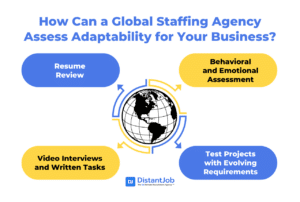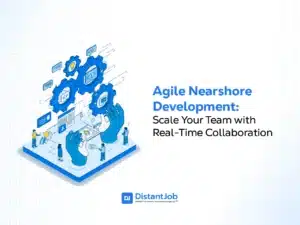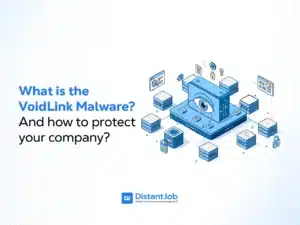Don’t worry. The software engineer job market is slowly recovering from the COVID-19 pandemic. New job positions are available, and companies are hiring. However, the number of tech talent is large, which makes businesses picky about recruitment. However, AI won’t replace developers or engineers. Skynet won’t steal anyone’s job, and you don’t have to join Sarah Connor in a rebellion against the machines.
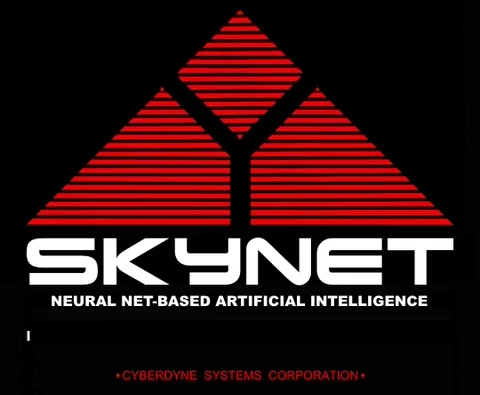
The software engineer job market is in a strange paradox. Engineers apply to numerous positions without a single response. Yet, hiring managers and business owners struggle to fill roles, allegedly due to skill gaps in candidates and AI.
What is truly happening? Is the job market broken? Will AI replace software engineers?
Today, we will discuss the state of the job market for software engineers in 2025 and what’s expected to be in the future.
Software Engineer Job Market: How did we get here?
In the early 2010s, learning to code went from a niche job to a mainstream mantra. Tech leaders and celebrities alike promoted the idea that coding was the skill of the future.
Codecademy’s 2012 “Code Year” initiative, for example, gained media buzz and endorsements from figures like New York Mayor Michael Bloomberg. By 2013, non-profits like Code.org launched the Hour of Code campaign with backing from the highest levels – even President Barack Obama publicly endorsed Americans to learn coding.
It sounded like a good plan. Programmers used to be scarce. By incentivizing people to learn to code and embrace the career, companies could find more professionals, and the bigger demand would lower salary costs.
It was the rapid rise of coding bootcamps. These short, intensive programs promised to turn novices into employable developers in a matter of months – a radical alternative to four-year computer science degrees.
In the meantime, computer science enrollment surged dramatically in the 2010s. Departments that once graduated a few dozen majors were inundated with students. Nationally, the number of computer science majors quadrupled from 2005 to 2023, according to The Atlantic.
Tech Layoffs: The Bubble Eventually Bursts
By the late 2010s, the U.S. was producing more entry-level developers than ever, between university grads and bootcamp alumni. This influx would later contribute to increased competition for junior roles. But initially, it seemed justified by industry growth.
After all, tech companies couldn’t hire engineers fast enough during the boom times, a reality that would soon be upended.
The software engineer job market bubble was given a second life due to the COVID-19 pandemic overhiring. The tech market needed software engineers, either working in a home office or otherwise. As soon as the pandemic ended, the tech industry, now oversaturated with tech talent, started the massive layoffs.
The AI excuse
To add salt to the injury, many statements from the big tech companies led other businesses to believe AI would replace developers and software engineers.
The result was many smaller and medium-sized companies playing Simon Says with their employees, imitating the Big Tech companies’ layoffs, and investing in AI to substitute human programmers.
Now AI has a bubble on its own, and those who fired their employees might feel the need to hire them again, soon. Recently, statements from big techs finally acknowledged junior software developers over AI.
The Skill Gap
That being said, the skill gap is an issue, even if the developers don’t take it that way. As hiring managers receive hundreds, or even thousands, of job applications, the entry bar for job postings is higher than ever.
The International Data Corporation forecasts that in 2026, 90% of all companies worldwide will feel the skill gap impact, causing around $5.5 trillion in losses. These losses will be caused by skill gaps, impacting product delays, impaired competitiveness, and even causing the loss of an entire business.
I hate bringing the bad news, but a single bootcamp won’t land you a job. We are not in the 2010s anymore. Even if you have done ten bootcamps or more, that alone won’t guarantee you being a cultural fit or a viable candidate for a junior software engineer position nowadays.
Finishing a computer science or software engineering graduation isn’t enough as well; it will give you a better formal education for the market, but it still isn’t enough to be above the skill gap.
The Software Engineer Job Market Today
While the IT market has been showing growth and decline, the software engineer job market is slowly increasing, according to TrueUp. The open tech jobs are 37% higher than their lowest point between 2022 and 2025. That being said, it’s not as high as it used to be during the pandemic, reaching -53% from its peak.
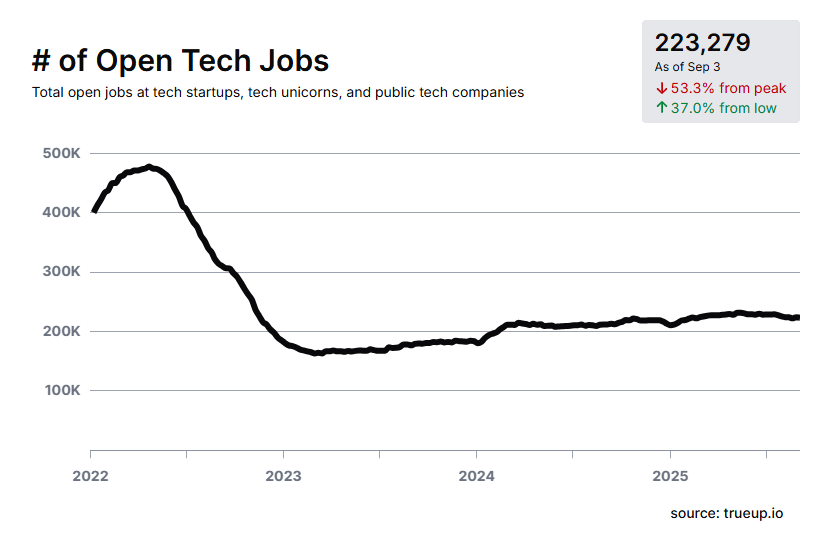
It’s likely to take at least a decade before reaching its former glory.
It’s important to note that the layoffs were already occurring during the pandemic. While 2020 had a big hiccup with 120,000 layoffs, 2021 made the companies hesitate to lay off more (only 25,000). Eventually, the tech companies were unable to keep up with the overhiring, despite the pandemic uncertainty, and laid off 244,000 employees in 2022. After 2023 and more than 430,000 layoffs, companies realized that their productivity wasn’t decreasing, and they are comfortable keeping the massive layoffs.
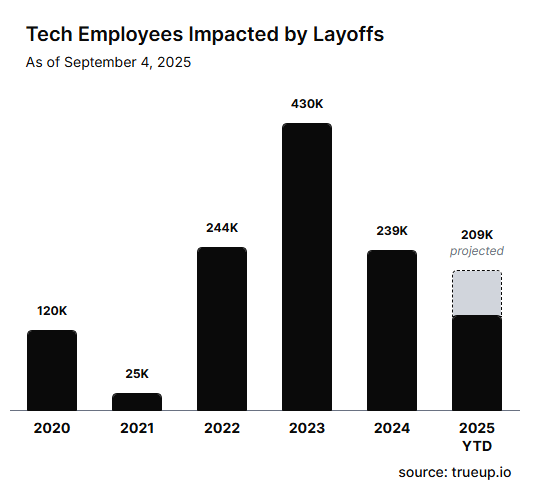
In the last twelve months, there were around 162,446 employees impacted by layoffs. Around 25% of them were just in July (24,687 employees).
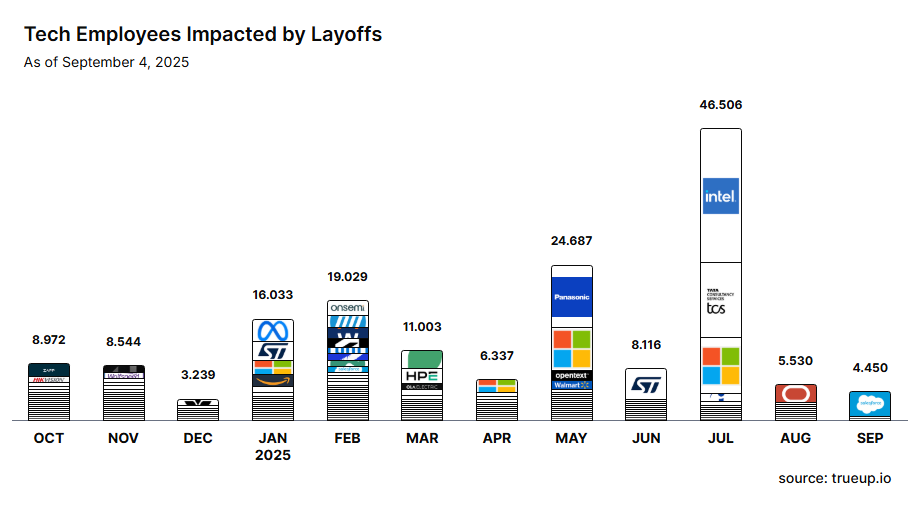
What does this slow growth and massive layoffs mean in the Software Developer Job Market?
A slower hiring pace, combined with mass layoffs, indicates that companies are becoming more selective. They’re not just looking to fill job positions. Companies want to hire talent who can deliver value immediately and efficiently.
The era of “hire first, find later” in the 2010s is over. Now, companies are looking for engineers who demonstrate:
- Direct Impact: Ability to work on projects that generate revenue or cut costs quickly.
- Adaptability and Continuous Learning: Ability to adapt to new technologies and methodologies, such as Artificial Intelligence (AI), which is streamlining development at the same time it generates technical debt.
- Business Insights: Understanding how code aligns with the company’s business objectives. This is especially true for senior and staff positions.
And it’s unlikely those abilities are available to learn at bootcamps or universities, except maybe for AI. A prospective software engineer must learn about them somewhere else quickly.
For engineering and business leaders, you need to create job descriptions that prioritize potential, learning velocity, and foundational skills over a long checklist of specific, rare experiences.
The talent gap cannot be closed by hiring alone, and companies must invest in a “build” strategy as a complement to their “buy” strategy. It’s time to commit to reskilling and upskilling the existing workforce, as this is the only way to embed new skills like AI fluency across the company. Companies that invest in their employees will not only close skills gaps but will also improve retention and build a more resilient workforce. Finally, businesses must actively foster a culture of continuous learning. The following table addresses the companies’ new needs:
| Old Paradigm | New Paradigm | |
| Talent Strategy | “Buy” (hire specific talent for a role) | “Build” (reskill existing workforce) and “Buy” (hire for potential) |
| Hiring Focus | Rigid credentials and legacy tool expertise | Basic hard skills, adaptability, and learning velocity |
| Candidate Profile | The “Unicorn” (pre-packaged, exact experience) | The “Unicorn” and the “Diamond in the Rough” (high potential, project-based experience) |
| Job Descriptions | A rigid checklist of must-have skills and past experiences | Broad, outcomes-focused requirements that prioritize problem-solving |
Top Software Engineering Roles in Demand for 2025
In 2025, popular roles for software engineers include AI/ML Engineer, Cloud security Engineer, Cybersecurity Engineer, Data Engineer, and DevOps Engineer, driven by the increasing integration of AI, cloud infrastructure, data analysis, and the need for secure, reliable systems.
Full-stack developers also remain in high demand, especially those capable of handling both front-end and back-end development. Specialized roles in areas like blockchain, gaming, and embedded systems also offer significant opportunities.
AI and Machine Learning Engineers
These professionals work on building, implementing, and fine-tuning AI and machine learning models and are needed across various industries.
Cloud Engineers
They focus on managing, designing, and scaling cloud-based systems and infrastructure. Cloud engineers specialize in platforms like AWS, Azure, and GCP, but they also learn how to design, build, and maintain a private cloud. Considering the cloud repatriation trend, mastering a single cloud platform won’t be useful for your career, so the recommendation is to know how to use them, but master none. Unless your company says otherwise.
Cybersecurity Engineers
Engineers specialized in security are key to protecting systems from online threats. This role involves securing software, networks, and data from cyberattacks.
Data Engineers
These engineers design and develop systems for collecting, processing, storing, and analyzing large datasets, often using Python, SQL, NoSQL, and cloud-based data tools.
DevOps Engineers
These DevOps specialists facilitate the integration of software development with IT operations, focusing on automation, continuous integration/continuous deployment (CI/CD), and ensuring smooth, reliable software releases.
Skills for Software Engineers to Get a Job in 2025-2026
Companies are shifting the focus from traditional programming to specialized, high-value domains. Yes, you still need to learn a programming language and software engineering best practices. However, that’s just the tip of the iceberg in the software engineer job market for 2025.
Hard Skills for Software Engineers
For software engineers, there are four hard skills in demand: AI proficiency (not prompting, but creating one), Security, Data (Analysis, Science, or Engineering), and DevOps/Cloud (not the same thing, but closely related.
AI/ML Engineering
Machine Learning and AI models led to drastic improvements in product design, manufacturing efficiency, healthcare diagnostics, fraud detection, and many other areas. It won’t steal your job, however. It’s your new tool in your utility belt, and if you don’t know how to use it, you are out of the market.
Cybersecurity
The cybersecurity landscape in 2025 is more complex and perilous than ever. Cyber threats have grown in sophistication, and attacks continue to surge across all industries. In the past year alone, Verizon analysts tracked over 12,000 confirmed data breaches, the largest volume on record.
Data
We live in the Big Data Era. Today, data is extremely large and complex collections (structured, semi-structured, and unstructured), generated at high speeds and volumes from diverse sources, such as social media, sensors, and financial transactions. Big data analytics helps organizations extract valuable insights, improve decision-making, and achieve strategic goals. The software engineer job market appreciates software engineers able to collect, process, and extract insights from large datasets to inform decisions and build models.
DevOps and Cloud Engineering
DevOps is a philosophy that teaches breaking knowledge silos and involves developers and operators from end-to-end SDLC. Meanwhile, Cloud Engineering is a field for designing, building, and maintaining cloud-based systems and applications, focusing on reliability, scalability, and security. They are a match made in heaven, so they are often confused with each other. Companies need both competencies in a candidate.
| Skill Category | Specific Competency | Why It’s Critical in 2025 | Example Tools/Frameworks |
| AI & Machine Learning | Foundational knowledge of AI/ML, with a focus on Generative AI and Large Language Models (LLMs). | Enables the engineer to leverage AI for augmentation and build AI-powered applications, a high-growth area. | TensorFlow, PyTorch, GitHub Copilot, Cursor |
| Cloud Engineering | Mastery of cloud services, serverless architecture, and containerization. | Cloud is the infrastructure for all modern applications; expertise is essential for building scalable systems. | Amazon Web Services (AWS), Microsoft Azure, Google Cloud Platform (GCP), Docker, Kubernetes |
| DevOps | Knowledge of continuous integration and continuous deployment pipelines. | Automation is a key trend in software production; these practices ensure quick and reliable releases. | Jenkins, GitHub Actions, GitLab CI/CD |
| Cybersecurity | The ability to build secure systems and protect user data. | Cybersecurity is of immense importance across all industries, and an engineer who can build secure systems is highly valued. | OWASP, penetration testing tools |
| Data Engineering | Proficiency in handling and analyzing large datasets | Data is central to building data-driven applications, and expertise in creating data pipelines is in high demand | Apache Spark, Hadoop, PostgreSQL, MongoDB |
Soft Skills for Software Engineers
A software engineer (or any professional, to that matter) can’t afford to have just technical skills. We are in an era of professionals with both interpersonal skills and the capability to solve problems in hard situations.
Adaptability
The technology sector is in a state of constant flux, with new tools and paradigms emerging at a rapid pace. This fluidity makes adaptability an indispensable skill. Automation impacts as many as 66% of jobs by 2025, according to PwC. One must embrace the new technologies, especially AI.
Analytical Thinking
The ability to critically assess complex information and develop rational solutions. Analytical thinking is valued precisely because it is something that even the most advanced computers cannot replicate in a human-like manner.
Communication and Collaboration
Modern software projects are rarely a one-person job; they require cross-functional teams of developers, designers, and product managers. Communication is the number one most requested skill in the job market overall, according to Aura Intelligence, after analyzing two million job postings.
Emotional Intelligence
High emotional intelligence is also a top skill for the future of work, allowing individuals to build stronger relationships, manage conflicts constructively, and foster team cohesion. An AI cannot replicate those abilities.
| Skill | Definition | Why It’s Critical in 2025 |
| Adaptability | The ability to pivot quickly in response to change and adjust strategies to new technologies and priorities. | Automation impacts 66% of jobs by 2025; it keeps employees resilient and valuable. |
| Analytical Thinking | The ability to critically assess information, parse it, and develop rational, creative solutions. | Identified as the top reskilling focus for companies, AI cannot replicate human critical analysis. |
| Communication & Collaboration | The ability to express ideas clearly, listen actively, and work effectively on diverse, cross-functional teams. | The glue that holds teams together in modern, often remote, work environments. |
| Emotional Intelligence | The ability to regulate one’s own emotions while understanding those of others. | A top 10 skill for the future of work according to the World Economic Forum; fosters stronger relationships, manages conflicts constructively, and cannot be replicated by AI. |
Why Companies Are Turning to Offshore and Remote Software Engineers in 2025
There is a global demand for scalable solutions. Companies are widely employing remote engineers to access cost savings, a global talent pool, and increased flexibility (including tech giants like Google and Microsoft). Hiring offshore software engineers can save companies from 40% to 70% on software development costs compared to hiring in the U.S..
According to Verified Market Research, the offshore software development market is projected to reach $283 billion by 2031, growing at a CAGR of 10.13% from 2024 to 2031. Market experts forecast that 2033 is expected to be worth around USD 389.7 billion, growing at a CAGR of 12.5%.
Conclusion
The software engineer job market is not broken; it’s evolving. The days of simply having a degree or completing a bootcamp and expecting a job offer are behind us. The market has matured, and it now demands a new kind of professional: one who is not only technically proficient but also adaptable, business-savvy, and equipped with a diverse set of skills.
The future belongs to software engineers who view technology as a tool for solving business problems, not just as a set of coding challenges.
For companies, the path forward involves adopting a “build” and “buy” strategy—investing in their current workforce while seeking new talent that demonstrates high potential.
Are you ready to build your team with top-tier remote talent? Don’t let the new landscape of the software engineer job market hold you back.
Schedule a call with us today and learn how you can hire exceptional remote developers. No hidden fees, no fine print. Only spend money if you actually find the talent of your dreams. And a three-month guarantee to get all your money back, no questions asked!


